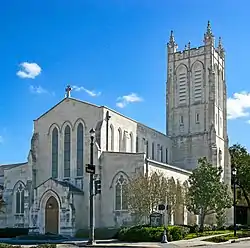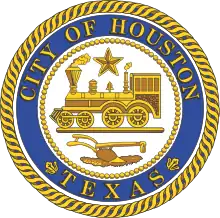Midtown Houston | |
|---|---|
 The intersection of Bagby and McGowen streets in western Midtown | |
|
Seal | |
| Country | |
| State | |
| County | Harris County |
| City | |
| Area | |
| • Total | 1.24 sq mi (3.2 km2) |
| Population (2015) | |
| • Total | 8,597 |
| • Density | 6,900/sq mi (2,700/km2) |
| Time zone | UTC-6 (CST) |
| • Summer (DST) | UTC-5 (CDT) |
| ZIP codes | 77002, 77004, 77006 |
| Area code(s) | 713, 281, 346, and 832 |
| Website | midtownhouston.com |

Midtown is a central neighborhood of Houston, located west-southwest of Downtown. Separated from Downtown by an elevated section of Interstate 45 (the Pierce Elevated), Midtown is characterized by a continuation of Downtown's square grid street plan, anchored by Main Street and the METRORail Red Line. Midtown is bordered by Neartown (Montrose) to the west, the Museum District to the south, and Interstate 69 to the east. Midtown's 325 blocks cover 1.24 square miles (3.2 km2) and contained an estimated population of nearly 8,600 in 2015.[1][2]
Originally populated as a Victorian-style residential neighborhood in the 19th century, Midtown experienced an economic depression during the latter half of the 20th century, resulting in the departure of residents and businesses and a proliferation of vacant land.[3] The formation of the Midtown Redevelopment Authority in the early 1990s and a renewed interest in Houston's urban core resulted in the gentrification of the district throughout the 2000s, fueled by an influx of young residents and the development of a vibrant nightlife. Like many other gentrified areas of Houston, Midtown's street signs are themed, specific to the area's logo, and there are many parks, sculptures, and businesses that include “Midtown” in their name, as a form of economic unity and to further attract more visitors and residents.[3][4] Midtown has continued its rapid development through the 2010s, but the district continues to face issues of crime, inadequate infrastructure, chronic homelessness, and geographic disparities in public investment.[5]
History

Around 1906 what is now Midtown was divided between the Third Ward and Fourth Ward.[6] Before the 1950s what is now Midtown was a popular residential district. Increasingly, commercial development led homeowners to leave for neighborhoods they considered less busy. The area became a group of small apartment complexes, low-rise commercial buildings, and older houses. According to a City of Houston report, the remaining churches and the Houston Community College System Central campuses provided the neighborhood's "only stability."[7]
In the 1970s, Midtown became home to Little Saigon, a neighborhood of Vietnamese and Vietnamese Americans, who pioneered the redevelopment of Midtown Houston. During the 1980s, Travis and Milam Streets were viewed as a mirror image of 1970s era Saigon.[8] The Vietnamese areas were established around Milam Street, Webster Street, Fannin Street, and San Jacinto Street.[7] By 1991 this Little Saigon had Vietnamese restaurants, hair salons, car shops, and travel agencies. Mimi Swartz of Texas Monthly stated in 1991 that "Little Saigon is a place to begin easing into a new country".[9]
On June 24, 1994 Isabella Court at 3909-3917 South Main Street received listing in the National Register of Historic Places.[10]
The City of Houston established the Midtown Tax Increment Reinvestment Zone (TIRZ) in 1995.[11] The establishment of the TIRZ led to the opening of upper income townhomes and apartment complexes in western Midtown and the area along Elizabeth Baldwin Park. Between 1990 and 2000 the area within the Midtown Superneighborhood saw the population increase from 3,070 to 5,311. The increase by 2,241 people was 73% of the 1990 population. During that period about 2,200 multi-family units opened, particularly along Louisiana Street and West Gray Street. Since the total multi-family acreage remained at a small number, the population increase also increased the density of the area. During the 1990s commercial uses increased, particularly along Main Street and Louisiana Street.[7] In 1999 the 76th Texas Legislature created the Midtown Management District.[11]
By 2004, higher rents and street construction have reduced the number of Vietnamese American businesses, many of which have relocated to the outer Houston Chinatown in the Bellaire Boulevard corridor west of Sharpstown.[8] On May 1 of that year, during the 6th Annual Asian Pacific American Heritage Month Festival, the section of Midtown along Milam Street and Travis Street near Tuam Street received the designation "Little Saigon."[12]
In 2009 Houston City Council approved the expansion of the Midtown TIRZ by 8 acres (3.2 ha). The new territory includes the Asia House, the Buffalo Soldiers Museum and the Museum of African-American culture.[13]
In 2014 the ranking website Niche stated that Midtown was the favorite neighborhood for millennial people.[14]
Cityscape
In 2010 Denny Lee of The New York Times said that Midtown, a "mixed-use" district, was "dotted with" bánh mì restaurants.[15] By 2012 many new bars, retail operations, and restaurants had opened in Midtown. Ed Page, a retail broker, said in 2012 that Midtown has not yet seen any significant new retail; he was referring to big box stores.[16]
As of 2010 five flower shops are located along Fannin in a section of Midtown. One decade before 2010 there were over one dozen flower shops in that area.[17] In 2003 the flower shop owners were mostly Asian. The shops, along four city blocks, were centered on Rosedale Street.[18] The number declined after the establishment of the METRORail Red Line. Nancy Sarnoff of the Houston Chronicle said in 2010 that the remaining flower shops told her that the establishment of the line helped cause several of their competitors to go out of business.[17]
Midtown has no traditional hotels. As of 2023, Midtown has one bed and breakfast with 7 rooms on Brazos Street (La Maison in Midtown). Lodgeur is Midtown's largest provider of short-term rentals and furnished apartments,[19] with 50 units in Mid Main Lofts on Main Street.
Little Saigon

Midtown was known for a concentration of Vietnamese businesses, termed "Little Saigon". Vietnamese in Houston, in the 1970s, had settled Allen Parkway Village. Midtown was in proximity and was relatively inexpensive.[20] Midtown became a center of business and religion for ethnic Vietnamese across the Houston area even though very few ethnic Vietnamese actually resided in Midtown.[21]
By 1991 this Little Saigon had Vietnamese restaurants, hair salons, car shops, and travel agencies,[22] and as of 2000 businesses there included grocery stores, medical and legal offices, restaurants, music and video stores, hair styling shops, business service offices, and jewelry stores.[23] Mimi Swartz of Texas Monthly stated in 1991 that in what is now Midtown, "Little Saigon is a place to begin easing into a new country."[22] Due to the actions of a group of Vietnamese-American leaders led by My Michael Cao, who served as the President of the Vietnamese Community of Houston and Vicinity (VNCH), a resolution that installed Vietnamese street signs along Milam Street in Midtown was passed.[24] Vietnamese street signs have denoted the area since 1998.[25] In 2004, this area was officially named "Little Saigon" by the city of Houston.[26]
The redevelopment of Midtown Houston from run-down to upscale increased property values and property taxes, forcing many Vietnamese-American businesses out of the neighborhood into other areas.[27] By 2003 the number of Vietnamese business declined, with many of them moving to the Southwest Houston Little Saigon,[21] despite the beautification projects occurring.[28] Hope Roth stated c. 2017 that pressure from other new developments and increase in costs related to land and space caused a decline in Little Saigon. Roth stated that many of the area restaurants still remain,[29] but increasingly cater more to mainstream American tastes.[30] In 2010 Denny Lee of The New York Times wrote that "traces" of the Vietnamese community remained.[31]
Demographics
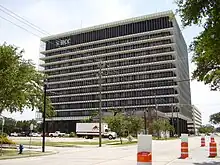
As of 2012 Midtown has about 8,600 people. Midtown had a 65% population increase in a ten-year period.[16]
According to the 2000 Census, the Super Neighborhood #62 Midtown (which mostly corresponds to the boundaries of the Midtown District) contained a total of 5,311 residents. The racial makeup of the area was 45% (2,439 people) White, 18% (949 people) Black or African American, 6% (320 people) Asian, less than 1% (8 people) Native American, less than 1% (35 people) from other races, 1% (70 people) from two or more races and 28% (1,490 people) of the population were Hispanic or Latino The super neighborhood contained a total of 4,559 people above the age of 18. The super neighborhood contained a total of 3,219 people who were male and 2,092 people who were female. 18 people were in nursing homes. Nobody was in a correctional institution, a university or college dormitory, or a military quarter. There were 2,326 households, with a population of 4,142 in those households. The average household size is 1.78 people.[32]
Some parts of the Midtown TIRZ are within Super Neighborhood #66 Binz.[33]
Transportation
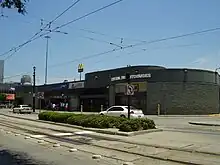
Metropolitan Transit Authority of Harris County, Texas, is the area transit authority. The METRORail Red Line runs directly through Midtown along Main Street. Three stops (Wheeler, Ensemble/HCC, and McGowen) are located in Midtown. Bus routes 1, 8, 25, 60, 65, and 182 stop at Wheeler Station. Routes stopping at the Downtown Transit Center, adjacent to Midtown and located in Downtown, include 11, 15, 24, 30, 35, 52, 60, 70, and 77. Other routes serving Midtown include 3, 5, 33, 42, 44, 53, 56, 82, 85, 102, 108, 131, 261, 262, 265, 269, 274, and 283.[34][35]
An intercity bus station served by Greyhound Lines and several bus lines that serve Mexico and Central America) were located in Midtown.[36] The bus station was built in 1979 and had 15 bus bays.[37] Additional buses came to the Midtown bus station after the 1990 closing of a bus terminal east of Downtown.[38] In 2008 the Houston Press named the Greyhound Terminal as "best place to people watch."[36] In 2023 the Greyhound station is scheduled to close after November 30, 2023 and consolidate with a bus station in Magnolia Park, East End serving other lines.[39] As criminal activity had occurred around the station, there were people living in the area who had a positive reception to the station's closure.[37]
Government and infrastructure
Local government
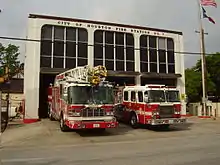
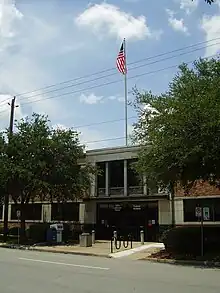
The Midtown Management District is headquartered in Suite 355 at 410 Pierce Street.[40] During previous eras the management district was headquartered in Suites 350–355 in the Bienville Building at 3401 Louisiana Street.[41][42]
Houston Fire Department Station 7 is located in Midtown.[35][43] The station is in Fire District 8.[44] The station "Young America #7" first opened in 1878. Several months later the station's name changed to "Eagle #7" and the station was located on Congress Street near Main Street. In 1899 the station moved to the intersection of McIlhenny and Milam. The station moved to its current location in 1969. A renovation was scheduled for the financial year of 2009.[43]
The Houston Police Department's South Central Patrol Division,[45] headquartered at 2022 St. Emanuel.,[46] serves the district.
As of 2011 two Houston City Council districts, C and D, cover portions of Midtown.[47][48] Previously two districts, D[49] and I [50] covered portions of Midtown.
The City of Houston established the Midtown Tax Increment Investment Zone, which takes a portion of the ad valorem taxes generated within its boundaries to finance infrastructure and reimburse developers, in 1995. A nine-member board of directors appointed by the City of Houston, Harris County, and the Houston Independent School District (HISD) governs the Midtown TIRZ, which is also known as Reinvestment Zone Number 2.[11]
Harris Health System (formerly Harris County Hospital District) designated Martin Luther King Health Center for the ZIP code 77004, Casa de Amigos Health Center in Northside for 77006, and Ripley Health Center in the East End for 77002. The nearest public hospital is Ben Taub General Hospital in the Texas Medical Center.[51]
State representation
The Texas Department of Criminal Justice (TDCJ) operates the Houston VII District Parole Office in Midtown.[52] Midtown is located in District 147 of the Texas House of Representatives. As of 2008, Garnet F. Coleman represents the district.[53] Midtown is within District 13 of the Texas Senate; as of 2008 Rodney Ellis represents that district.[35][54]
Federal representation

Midtown is in Texas's 18th congressional district. [35][55] As of 2008 its representative is Sheila Jackson Lee.
The Sam Houston Station,[56] the new Houston Post Office on Hadley Street in Midtown, became the city's main post office in 2015, replacing the previous one in Downtown Houston.[57]
The United States Government operates the La Branch Federal Building in Midtown; originally built as a Veterans Administration Building in 1946, it as of 2009 houses federal offices.[58] The Social Security Administration previously had its own office at 3100 Smith Street.[59]
Foreign governments
The Chinese Consulate-General, Houston maintained an education office in Midtown.[60] The consulate closed in 2020.
Economy
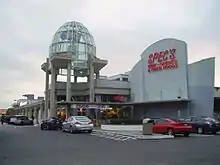
Spec's Wine, Spirits & Finer Foods has its headquarters in Store #00 Downtown Location in Midtown.[61][62][63] At one time the FlightAware headquarters were in Midtown.[64][65]
Education
Colleges and universities

Houston Community College System's Central Campus is located in Midtown.
Midtown is close to the University of Houston (UH), the University of Houston–Downtown (UHD), Texas Southern University, Rice University, and University of St. Thomas.
Primary and secondary education
Public schools
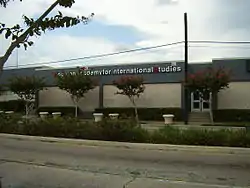
Midtown is served by Houston Independent School District (HISD).[61] Midtown is divided between Trustee District IV, represented by Paula M. Harris as of 2008, and Trustee District VIII, represented by Diana Dávila as of 2008.[66]
Two schools, Gregory-Lincoln Education Center (in the Fourth Ward) and MacGregor Elementary School (in the Hermann Park area), serve sections of Midtown for primary school.[67] All pupils in Midtown who are north of U.S. Route 59 (all of the Midtown Super Neighborhood and almost all of the Midtown Management District) are zoned to Gregory-Lincoln Education Center for middle school.[68] A small portion of the Midtown Management District south of U.S. Route 59 (which is in Super Neighborhood #66 Binz instead of Super Neighborhood #62 Midtown) is zoned to Cullen Middle School;[69] the portion contains one multi-family residence. Beginning in 2018 Baylor College of Medicine Academy at Ryan also serves as a boundary option for students zoned to MacGregor elementary school.[70]
Almost all of Midtown is zoned to Lamar High School (in Upper Kirby),[71] while a small northwest section of Midtown is zoned to Reagan High School (in the Houston Heights).[72]
An HISD magnet secondary school, Houston Academy for International Studies, is located in the HCCS Central campus. The Young Women's College Preparatory Academy (formerly housing the Contemporary Learning Center), an alternative public school, is near Midtown. A state charter school, a charter school not affiliated with HISD, called Houston CAN! Academy Main is also located in Midtown.[73]
Carnegie Vanguard High School, in the Fourth Ward,[74] is in proximity to Midtown.[75]
History of public schools in Midtown
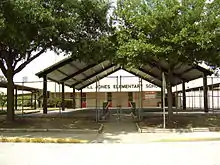
Charlotte Allen Elementary School opened on February 1, 1907. At the time schools were segregated by race, and Allen was reserved for white children. It was later converted into a school for black children.[76] San Jacinto High School, located in Midtown, and Reagan High School, located in the Houston Heights, opened in 1926. Lamar High School opened in 1937. In 1956 Allen Elementary moved to northwest Houston and its former location became J. Will Jones Elementary School.[77] Ryan Middle School opened in 1958 after Yates High School moved to a new location.[78]
In 1962 San Jacinto High School gained a technical program. Gregory-Lincoln Education Center opened in 1966. In 1971 San Jacinto lost its neighborhood program. During the same year, Fannin Elementary School, which was located at 2900 Louisiana Street in what is now Midtown, closed. In 1976 the Contemporary Occupational Training Center, a non-traditional vocational school, opened in what is now Midtown.[77] In 1985 San Jacinto closed for good when its technical program ended. As of 2008 the San Jacinto campus now houses the central campus for Houston Community College. The Contemporary Occupational Training Center closed in 1991.[77]
J. Will Jones Elementary School,[35] located in Midtown, received an unacceptable academic rating from the Texas Education Agency. Under principal Brian Flores, the school's test scores increased in a five-year period until 2009. Around 2009 the school provided bus services to several homeless shelters within the school's attendance zone.[79] As of 2009, over 1/3rd of Jones's students were homeless.[80] About 100 of the around 300 students were homeless, and about 30 came from a Salvation Army shelter. Flores said that this was the highest number of homeless students during his career as a principal at Jones.[81] In 2008 99% of the students were on free or reduced lunch. Every year the school held its "Gift of Giving" ceremony.[82]
Before the start of the 2009–2010 school year Jones was consolidated into Blackshear Elementary School, a campus in the Third Ward.[83][84] During its final year of enrollment J. Will Jones had more students than Blackshear. Many J. Will Jones parents referred to Blackshear as "that prison school" and said that they will not send their children to Blackshear. Jones was scheduled to house Houston Community College classes after its closure as a school.[85] Supporters of keeping J. Will Jones created a campaign to try to keep J. Will Jones open.[79] The Jones campus became the campus of Houston Academy for International Studies.[86] Blackshear and Gregory-Lincoln elementary took portions of J. Will Jones's former territory in Midtown.[87][88] The portion zoned to Cullen Middle was zoned to Ryan Middle School until 2013.[69][89] As part of rezoning for the 2014–2015 school year, all areas in Midtown previously under the Blackshear attendance zone were rezoned to Gregory-Lincoln K-8.[90]
Private schools
As of 2019 the British International School of Houston in Greater Katy has a school bus service to Midtown.[91]
The Kinkaid School, a private school, was located in the house of Margaret Kinkaid, what is now Midtown,[92] from its founding in 1906 to the time when the school moved to a campus in Montrose. In 1957, the school moved to the city of Piney Point Village, where it resides as of 2008.[93] Saint Agnes Academy, a private school, was located in what is now Midtown from its founding in 1906 to 1963. The school moved to the Sharpstown neighborhood in 1963, where it resides as of 2008.[94]
Holy Rosary Catholic School of the Roman Catholic Archdiocese of Houston opened c. 1913 and closed in 1963. The establishment of freeways caused suburbanization, and therefore, population loss, to occur in the area. Initially the parish kept the school building in hopes that the school would be re-established, but it was to be demolished in 2003 so a parish hall could be built there. Tom Bass and Gale Storm were alumni.[95]
Culture, parks and recreation


Midtown Park is located at the intersection of Bagby and Gray. The Midtown Management District and several businesses provided funding for the park.[96] Elizabeth Baldwin Park, operated by the City of Houston, is located at 1701 Elgin Street.[97] The 4.88-acre (19,700 m2) Park is between Crawford Street and Chenevert Street. The City of Houston acquired Baldwin Park in 1905. The stone fountain is from 1912. The park received upgrades in 1930 and 1931 stemming from a bond. A 2003 Midtown Tax Increment Reinvestment Zone bond sale and Midtown Management District plans led to further improvements. The park received a rededication on November 13, 2006. The park includes a Vietnamese Heritage Plaza which commemorates the Vietnamese settlement in Midtown.[98] Peggy's Point Plaza Park, operated by the city, is located at 4240 Main Street.[99]
Rice University housed their technology park, Rice Innovation District within Midtown.
In 2008, David Crossley from the Houston Tomorrow group proposed that the City of Houston should build a park in the area bound by Main Street and Travis Street on the north end and Tuam Street and McGowen Street on the south end. Crossley called the proposal "McGowen Green." John Nova Lomax, a journalist, published an article about the proposed park in the Houston Press.[100][101]
In 2012 the Midtown Redevelopment Authority and Camden Development Inc. announced that a new park would be established in Midtown in a 3.5-acre (1.4 ha) empty lot, for about $7 million.[102]
The Ensemble Theatre, an African-American theater company, has its studio in Midtown. The theater, founded by George Hawkins in 1976, is the largest African-American theater company in the United States.[103]
Syd Kearney of the Houston Chronicle stated that the opening of the Farrago World Cuisine Restaurant in 2000 "was one of the signs that once sleepy Midtown was coming to life."[104] This restaurant closed in July 2013.[104]
A gay nightclub, Rich's Houston, was in Midtown.[61][105] In 2019 the club announced it was going to Montrose, where it was previously.[106]
Religion
Trinity Episcopal Church is in Midtown.
Holy Rosary Catholic Church of the Roman Catholic Archdiocese of Galveston-Houston is in Midtown. The parish was established in 1913. In 1933 it constructed a parish hall. Pastor Joseph Konkel described that parish hall as the city's "only major construction project" due to the effects of the Great Depression on the city's economy.[107] Post-1970s suburbanization had resulted in a decline in parish membership. Circa 1994 the church bought 7,000 square feet (650 m2), which it used for educational programs, in an office complex. Parish membership increased due to gentrification of Midtown post-1994. By 2004 a 15,000-square-foot (1,400 m2) expansion was under way. In 2004 about 25% of the congregation was ethnic Vietnamese, and there are two masses per week in the Vietnamese language.[107] Therefore, it is one of five Vietnamese Catholic churches in the Houston area.[108]
The former Temple Beth Israel is in Midtown.
Media
The Houston Chronicle is the citywide newspaper. The Midtown Paper is a local area newspaper.[79]
Gallery
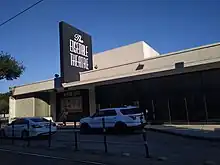
 Street signs in Midtown Houston are distinct from the plain green signs seen in most of Houston
Street signs in Midtown Houston are distinct from the plain green signs seen in most of Houston Another example of a Midtown street sign
Another example of a Midtown street sign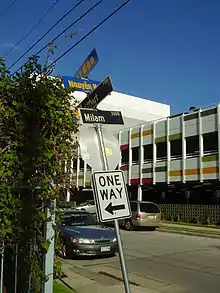 Vietnamese language street signs in Midtown
Vietnamese language street signs in Midtown Flower shops in Midtown
Flower shops in Midtown
See also
References
- Vu, Roy. "Constructing a Southern Vietnamese Community and Identity in Houston." (Archive) The Houston Review. University of Houston, 2006. Volume 3, No. 1. p. 27-31, 63–66. Available from ProQuest Dissertations and Theses, 406 p.
Notes
- ↑ "Super Neighborhood Resource Assessment: Midtown" (PDF). City of Houston. November 2017. Retrieved 2018-03-16.
- ↑ "The hidden history of Midtown and what it means for an ambitious area's future". CultureMap Houston. 2012-05-28. Retrieved 2018-03-16.
- 1 2 "History". Midtown Houston. Retrieved 2017-03-16.
- ↑ Hagerty, Kyle (2016-06-01). "Millennials Love Midtown And It's Easy To See Why". Bisnow Houston. Retrieved 2018-03-16.
- ↑ Mulvaney, Erin (2016-06-07). "East-west divide becomes an issue in Midtown". Houston Chronicle. Retrieved 2018-03-16.
- ↑ "Where the wards are Archived 2007-06-21 at the Wayback Machine." Houston Chronicle. Tuesday September 7, 2004. E1.
- 1 2 3 "Study Area 11 Archived 2010-05-30 at the Wayback Machine." City of Houston. Accessed October 21, 2008.
- 1 2 Sarnoff, Nancy. "Little Saigon tries to carry on / City pushing for ways to give area new life" (). Houston Chronicle. Sunday November 28, 2004. Business, 3.
- ↑ Swartz, Mimi. "Murder in the Melting Pot." Texas Monthly. Emmis Communications, December 1991. Vol. 19, No. 12. ISSN 0148-7736. START: p. 142. CITED: p. 174.
- ↑ "National Register Information System". National Register of Historic Places. National Park Service. July 9, 2010.
- 1 2 3 "Frequently Asked Questions Archived 2008-12-30 at the Wayback Machine." Midtown Management District. Retrieved on April 5, 2009.
- ↑ "Building New Saigon." Houston Institute for Culture. Retrieved on April 30, 2009.
- ↑ Snyder, Mike. "Council adds 3 museums to tax zone in Midtown." Houston Chronicle. December 29, 2009. Retrieved on January 2, 2010.
- ↑ Taylor, Carrie. "Houston's Midtown among best places in country for millennials." Houston Chronicle. April 16, 2014. Retrieved on April 19, 2014.
- ↑ Lee, Denny. "36 Hours in Houston." The New York Times. May 9, 2010.
- 1 2 Sarnoff, Nancy. "Development in Midtown on an upswing." Houston Chronicle. Tuesday October 30, 2012. Retrieved on November 1, 2012.
- 1 2 Sarnoff, Nancy. "A Valentine's Day reminder of an unrealized vision." Houston Chronicle. February 13, 2010. Retrieved on February 15, 2010.
- ↑ Davis, Rod. "Houston's really good idea Bus tour celebrates communities that forged a city." San Antonio Express-News. Sunday August 3, 2003. Travel 1M. Retrieved on February 11, 2012.
- ↑ https://alpha-maven.com/news/private-equity/lodgeur-incorporated-becomes-the-largest-hotelier-in-midtown-houston
- ↑ Roth, Hope (2017-09-21). "Little Saigon (Houston, Texas)". In Ueda, Reed (ed.). Content from America's Changing Neighborhoods: An Exploration of Diversity through Places (3 volumes). ABC-CLIO. pp. 770–772. ISBN 9781440828652. - Previews of book pages CITED: p. 770.
- 1 2 Hegstrom, Edward (2003-04-04). "Vietnamese businesses moving out of Midtown". Houston Chronicle. Retrieved 2022-07-06.
- 1 2 Swartz, Mimi. "Murder in the Melting Pot." Texas Monthly. Emmis Communications, December 1991. Vol. 19, No. 12. ISSN 0148-7736. START: p. 142. CITED: p. 174.
- ↑ 41.
- ↑ Vu, p. 29
- ↑ Kearney, Syd (September 2008). A Marmac Guide to Houston and Galveston. Pelican Publishing. pp. 164–. ISBN 978-1-58980-548-4. Retrieved October 19, 2010.
- ↑ "City adopts 'Little Saigon'". Houston Business Journal. May 10, 2004. Retrieved October 19, 2010.
- ↑ Nancy Sarnoff (November 28, 2004). "Little Saigon tries to carry on / City pushing for ways to give area new life". Houston Chronicle. Archived from the original on June 17, 2009. Retrieved October 19, 2010.
{{cite news}}: CS1 maint: bot: original URL status unknown (link) (). - ↑ Sarnoff, Nancy (2004-11-28). "Little Saigon tries to carry on / City pushing for ways to give area new life". Houston Chronicle. Archived from the original on 2009-06-17. Retrieved 2022-07-06.
- ↑ Roth, Hope (2017-09-21). "Little Saigon (Houston, Texas)". In Ueda, Reed (ed.). Content from America's Changing Neighborhoods: An Exploration of Diversity through Places (3 volumes). ABC-CLIO. pp. 770–772. ISBN 9781440828652. - Previews of book pages CITED: p. 771.
- ↑ Roth, Hope (2017-09-21). "Little Saigon (Houston, Texas)". In Ueda, Reed (ed.). Content from America's Changing Neighborhoods: An Exploration of Diversity through Places (3 volumes). ABC-CLIO. pp. 770–772. ISBN 9781440828652. - Previews of book pages CITED: p. 772.
- ↑ Denny Lee (May 9, 2010). "36 Hours in Houston". New York Times. Retrieved October 19, 2010.
- ↑ "Census 2000: Demographic Data by Super Neighborhood Midtown #62." City of Houston. Retrieved on April 11, 2009.
- ↑ "Census 2000: Demographic Data by Super Neighborhood Binz Area #66." City of Houston. Retrieved on April 11, 2009.
- ↑ "Downtown/Midtown Area Archived 2008-12-02 at the Wayback Machine." Metropolitan Transit Authority of Harris County, Texas. Retrieved on April 4, 2009.
- 1 2 3 4 5 "SERVICE AND IMPROVEMENT PLAN AND ASSESSMENT PLAN FOR FISCAL YEARS 2015-2024 Archived 2018-01-29 at the Wayback Machine." Midtown Houston. Retrieved on April 4, 2009. page 25/25 of the PDF
- 1 2 "Best Place to People Watch: Greyhound Bus Station." Houston Press. Retrieved on November 23, 2008.
- 1 2 Ruiz, Anayeli; McCord, Cory (2023-11-30). "Residents express their anger, fears over safety as Greyhound bus station moves to East End". KHOU-TV. Retrieved 2023-12-06.
- ↑ Begley, Dug (2023-11-28). "Greyhound leaving downtown Houston, with all service headed to East End depot". Houston Chronicle. Retrieved 2023-11-30.
- ↑ Grunau, Sarah (2023-11-29). "Houston Midtown Greyhound bus station to end service Thursday, property still listed for sale". Houston Public Media. Retrieved 2023-11-29.
- ↑ "About Midtown Houston." Midtown District. Retrieved on November 15, 2008.
- ↑ "Notice of Meeting. Wednesday March 1, 2006." Midtown Management District. Retrieved on April 6, 2009.
- ↑ "Home." Midtown Houston. March 21, 2003. Retrieved on April 6, 2009.
- 1 2 "Houston Fire Station #7. City of Houston. Retrieved on November 14, 2008.
- ↑ "Fire Stations." City of Houston. Retrieved December 4, 2008.
- ↑ "Crime Statistics for South Central Patrol Division." City of Houston. Retrieved on November 14, 2008.
- ↑ "VOLUNTEER INITIATIVES PROGRAM - Citizens Offering Police Support." City of Houston. Retrieved on November 14, 2008.
- ↑ City of Houston, Council District Maps, District C Archived 2012-12-24 at the Wayback Machine." City of Houston. Retrieved on November 5, 2011.
- ↑ City of Houston, Council District Maps, District D Archived 2012-01-27 at the Wayback Machine." City of Houston. Retrieved on November 5, 2011.
- ↑ "COUNCIL DISTRICT MAPS > DISTRICT D Archived 2008-10-07 at the Wayback Machine." City of Houston.
- ↑ "COUNCIL DISTRICT MAPS > DISTRICT I Archived 2008-03-16 at the Wayback Machine." City of Houston. Retrieved on November 14, 2008.
- ↑ "Clinic/Emergency/Registration Center Directory By ZIP Code". Harris County Hospital District. 2001-11-19. Archived from the original on 2001-11-19. Retrieved 2021-04-08. - See ZIP codes 77002, 77004, and 77006. See this map for relevant ZIP code.
- ↑ "Parole Division Region III Archived 2010-07-25 at the Wayback Machine." Texas Department of Criminal Justice. Retrieved on May 15, 2010.
- ↑ "District 147 Archived 2009-01-06 at the Wayback Machine." Texas Legislature. Retrieved on November 15, 2008.
- ↑ "Senate District 13 Archived 2011-06-28 at the Wayback Machine" Map. Senate of Texas. Retrieved on November 15, 2008.
- ↑ "Congressional District 18 Archived 2008-10-02 at the Wayback Machine." National Atlas of the United States. Retrieved on November 14, 2008.
- ↑ "Get Your Stamps There While You Still Can Downtown Barbara Jordan Post Office on Franklin St. Will Close Forever on May 15th." Swamplot. May 6, 2015. Retrieved on October 30, 2016.
- ↑ "1500 Hadley St. Replacement for Houston’s Shuttering Downtown Post Office Is Actually Somewhat Close to Downtown." Swamplot. Retrieved on October 30, 2016.
- ↑ "La Branch Federal Building." U.S. General Services Administration. Retrieved on April 16, 2009.
- ↑ "Social Security Administration 3100 Smith Street." Manta. Retrieved on May 13, 2009.
- ↑ "Teaching Chinese as a Foreign Language". Consulate-General of the People's Republic of China in Houston. Archived from the original on 2022-08-06. Retrieved 2020-07-25.
Education Office 811 Holman St. Houston, TX 77002
- Compare the street address to the map of Midtown in: "MIDTOWN MANAGEMENT DISTRICT SERVICE AND IMPROVEMENT PLAN AND ASSESSMENT PLAN FOR FISCAL YEARS 2015-2024" (PDF). Midtown Houston. p. 25. Retrieved 2020-07-25. - See "Exhibit A District Boundary Map" on PDF p. 25/25 - 1 2 3 There are separate boundaries for the Midtown Super Neighborhood and the Midtown Management District. See City of Houston maps: Midtown Super Neighborhood and Management district map. Retrieved on June 4, 2019. - Also see: Midtown Management District Land Use and Development Map (2006) and "SERVICE AND IMPROVEMENT PLAN AND ASSESSMENT PLAN FOR FISCAL YEARS 2015-2024 Archived 2018-01-29 at the Wayback Machine." Midtown Houston Management District. Retrieved on April 4, 2009. Map on page 25/25 of the PDF.
- ↑ "Contact Us Archived 2011-12-27 at the Wayback Machine." Spec's Wine, Spirits & Finer Foods. Retrieved on December 22, 2011. "Corporate office: Spec's Family Partners 2410 Smith Street Houston, Texas 77006"
- ↑ "SPEC'S 00-Downtown Location Archived 2016-03-06 at the Wayback Machine." Spec's Wine, Spirits & Finer Foods. Retrieved on December 22, 2011. "2410 Smith Street, Houston TX"
- ↑ "Contact Information." FlightAware. December 5, 2006. Retrieved on August 23, 2010. "FlightAware Suite 400-510 2450 Louisiana Street Houston, Texas 77006 "
- ↑ Midtown Management District Land Use and Development Map (2006) Retrieved on June 4, 2019.
- ↑ "Trustee Districts Map Archived 2012-07-11 at the Wayback Machine." Houston Independent School District. Retrieved on November 11, 2008.
- ↑ "Elementary School Zones 2015-2016." Houston Independent School District. Retrieved on August 20, 2015.
- ↑ "Gregory Lincoln Middle Attendance Boundary Archived 2009-02-27 at the Wayback Machine." Houston Independent School District. Retrieved on November 15, 2008.
- 1 2 "PROPOSED BOUNDARY FOR CULLEN MIDDLE SCHOOL." "AGENDA Board of Education Meeting March 07, 2013." Houston Independent School District. 30/105. Retrieved on June 30, 2013.
- ↑ "AGENDA Board of Education Meeting May 10, 2018." Houston Independent School District. Retrieved on October 12, 2018. F1 p. 86/135.
- ↑ "Lamar High School Attendance Boundary Archived 2011-09-28 at the Wayback Machine." Houston Independent School District. Retrieved on November 15, 2008.
- ↑ "Reagan High School Attendance Boundary Archived 2009-02-27 at the Wayback Machine." Houston Independent School District.
- ↑ "Houston Can! Academy Main." Texans CAN. Retrieved on November 15, 2008.
- ↑ Mellon, Ericka. "Fourth Ward site likely for new Carnegie Vanguard High School." Houston Chronicle. November 17, 2009. Retrieved on November 24, 2009.
- ↑ Mellon, Ericka. "Trustees to consider eliminating sports teams at Carnegie Vanguard." Houston Chronicle. Thursday, February 11, 2016. Retrieved on February 20, 2016.
- ↑ "History Archived 2004-09-15 at the Wayback Machine." J. Will Jones Accelerated Elementary School. Accessed March 30, 2019.
- 1 2 3 "School Histories: the Stories Behind the Names Archived 2011-07-10 at the Wayback Machine." Houston Independent School District. Accessed September 24, 2008.
- ↑ "About Archived 2008-12-11 at the Wayback Machine." Jack Yates High School. Accessed October 12, 2008.
- 1 2 3 Giglio, Mike. "The End Of The Road For J. Will Jones Elementary's Success Story." Houston Press. Monday June 29, 2009. Retrieved on September 13, 2009.
- ↑ Giglio, Mike. "Houston's Working Class Gets Bumped into Homelessness and Poverty by the Crashing Economy." Houston Press. Wednesday March 18, 2009. 1. Retrieved on October 13, 2011.
- ↑ Giglio, Mike. "Houston's Working Class Gets Bumped into Homelessness and Poverty by the Crashing Economy." Houston Press. Wednesday March 18, 2009. 2. Retrieved on October 13, 2011.
- ↑ Connelly, Richard. "Gift Giving at Soon-To-Be-Closed J. Will Jones Elementary." Houston Press. Monday December 15, 2008. Retrieved on October 13, 2011.
- ↑ "Board of Education Votes on School Consolidations Archived 2009-06-17 at the Wayback Machine." Houston Independent School District. October 9, 2008.
- ↑ Mellon, Ericka. "Tears and fears at HISD board meeting -- UPDATED Archived 2009-05-19 at the Wayback Machine." Houston Chronicle. October 9, 2008.
- ↑ Downing, Margaret. "Backlash Upon Backlash at HISD." Houston Press. December 2, 2008. 1.
- ↑ "Contact Archived 2009-08-21 at the Wayback Machine." Houston Academy for International Studies. Retrieved on August 19, 2009.
- ↑ "HISD PROPOSED ATTENDANCE BOUNDARIES FOR BLACKSHEAR, JW JONES, & GREGORY LINCOLN ES Archived 2012-02-25 at the Wayback Machine." Houston Independent School District. Retrieved on August 19, 2009.
- ↑ "J. Will Jones Elementary Attendance Boundary." (Archive) Houston Independent School District. Retrieved on August 20, 2009.
- ↑ "Ryan Middle Attendance Boundary Archived 2007-06-30 at the Wayback Machine." Houston Independent School District. Retrieved on November 15, 2008.
- ↑ "AGENDA Board of Education Meeting March 13, 2014." Houston Independent School District. Retrieved on March 15, 2014. "Current Attendance Boundaries" New 03/06/04 Attachment F-2 March 2014 p. 31/119. and "Proposed Attendance Boundaries" New 03/06/04 Attachment F-2 March 2014 p. 32/119.
- ↑ "School Bus Transportation". British International School of Houston. Retrieved 2019-03-30.
- ↑ "History". J. Will Jones Elementary School. 2007-12-01. Archived from the original on 2007-12-01. Retrieved 2019-03-30.
Mrs. Margaret Kinkaid was a Houston Public school teacher who later started a private school at the corner of Elgin and San Jacinto Streets. [this corner is in Midtown] Kinkaid School is presently located at Memorial Drive at Kinkaid Drive.
- ↑ "History." The Kinkaid School. March 13, 2007.
- ↑ "School History." Saint Agnes Academy. Accessed October 21, 2008.
- ↑ Gabriel, Cindy (2003-04-24). "Holy Rosary Catholic School alums to gather for 'Last Hurrah' Sunday". Houston Chronicle. Retrieved 2020-05-31.
- ↑ "Urban Planning." Midtown Houston. Retrieved on January 3, 2009
- ↑ "Neighborhood Parks." City of Houston. 1. Retrieved on January 3, 2009.
- ↑ "Baldwin Park." City of Houston. Retrieved on January 3, 2009.
- ↑ "Our Parks O-Z Archived 2008-12-27 at the Wayback Machine." City of Houston. Retrieved on January 3, 2009.
- ↑ Lomax, John Nova. "McGowen Green in Midtown?." "Hair Balls." Houston Press. October 15, 2008.
- ↑ "Page 2." McGowen Green. Accessed October 21, 2008.
- ↑ Miller, Doug. "Midtown Superblock tapped as site of inner city park." KHOU. March 27, 2012. Retrieved on March 30, 2012.
- ↑ Allman-Baldwin, Lysa. "Article: Ebony Escapes! to Houston." New York Amsterdam News. July 6, 2005. Retrieved on May 23, 2010. "Midtown Houston is home to The Ensemble Theatre Founded in 1976 by the late George Hawkins. The Ensemble has evolved to be the largest African[...]"
- 1 2 Kearney, Syd. "Sadness alert: Farrago World Cuisine has closed." Houston Chronicle. Monday July 29, 2013. Retrieved on July 31, 2013.
- ↑ Home. Rich's Houston. Retrieved on June 4, 2019. "2401 San Jacinto 77002 Houston, Texas"
- ↑ Guerra, Joey (2019-09-05). "Rich's nightclub is relocating to Montrose. And no, it's not taking over South Beach or Numbers". Houston Chronicle. Retrieved 2022-10-14.
- 1 2 Manning, Tom (2004-11-11). "Holy Rosary Church takes on project". Houston Chronicle. Retrieved 2020-05-31.
- ↑ Latson, Jennifer. "Mass honors those lost in Sherman bus crash." Houston Chronicle. September 8, 2008. Retrieved on May 5, 2014.
Further reading
- Binkovitz, Leah. "Fannin Street's last blooms." Houston Chronicle. February 10, 2015.
- Midtown Affordable Housing Plan - July 7, 2018
External links
- Midtown Houston Management District
- Midtown Houston Management District at the Wayback Machine (archive index)
- Midtown Houston Super Neighborhood
- Super Neighborhood #62 Midtown at the official Houston web site
- Midtown Civic Club Home
- WikiMapia
